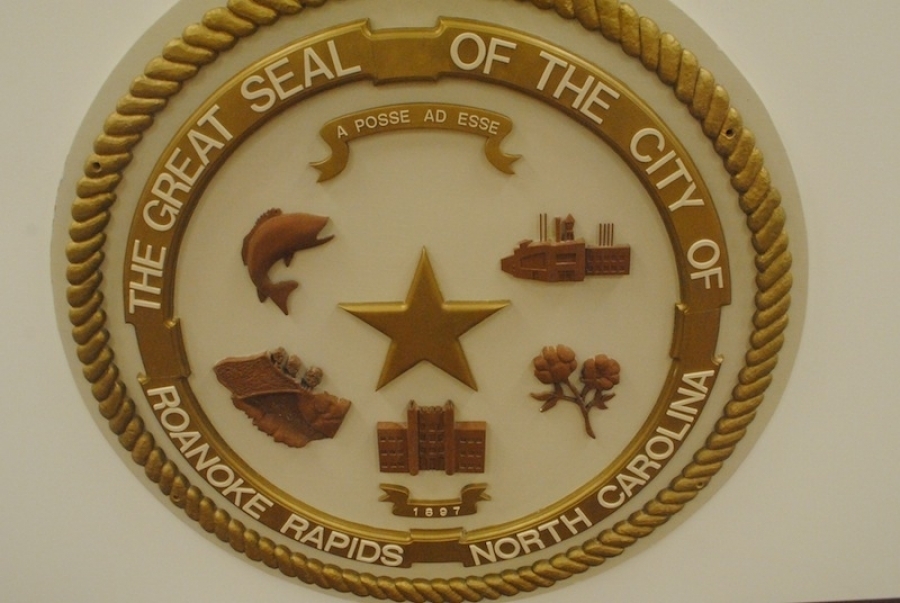The upcoming fiscal year budget for the city of Roanoke Rapids varies little from the current financial plan, City Manager Joseph Scherer told council at a work session Tuesday night.
Currently the $15,850,253 proposed budget has been planned without incorporating funding from the American Rescue Plan, of which the city anticipates to receive $4.19 million in funding.
Scherer said in his budget message the city currently does “not have enough specific guidance on what these funds can be utilized for by the city. We anticipate the city will be able to use them in the (upcoming budget) but cannot realistically include them in the budget for now.”
He said, however, “Depending on the timing we receive more specific guidance and the actual funds, we will recommend how to include these funds in the budget at a later date.”
He told council he expects to receive the first half of the coronavirus relief funds sometime in June.
Later in his budget message Scherer said the federal relief package will provide $5.6 billion in state fiscal relief with $1.35 billion earmarked for cities and towns. “Funding can be spent through 2024 and I am hopeful that the funding will be transformational for our city. We expect further guidance and clarification on expenditures these funds are eligible to be used for to be forthcoming from the United StatesTreasury and others in the coming weeks and months.”
As currently proposed, the budget allows city departments to maintain a minimal level of services without using fund balance or enacting a tax increase.
The proposed budget, he said, includes minimum department staffing levels and no capital projects or equipment acquisitions. It also does not include any travel or per diem expenses except for required licensing and certification. “As we consider our employees our most valuable resource, it does include maintaining some personnel benefits that we have provided in the past. However, it also does not include any cost-of-living (or) merit salary increases or employee bonuses.”
Scherer said potential grant funds are not included in the proposed budget. “If any grants are approved for use, we will ask city council at that time for a budget amendment for the grant amounts plus any matching funds requirement.”
Economic summary
The economic factors studied in preparing the budget is based on an annual revenue forecast which largely focuses on recovery from COVID-19 and a transition to a post-COVID era. “The COVID pandemic restrictions are beginning to be scaled back, which will help businesses and schools to get closer to returning to normal operations.”
Scherer said, “The city was fortunate to not have a large number of businesses fail during the pandemic, but we know some are still struggling to stay afloat. A number of businesses are having trouble either getting enough people to apply for work or getting inventory from suppliers. We anticipate our business community will maintain the momentum of positive growth and activity in the next fiscal year.”
North Carolina's unemployment rate was 5.9 percent in January, exceeding the prior year rate of 3.5 percent. “Wells Fargo anticipates labor force growth in this spring and summer as businesses reopen and pull job seekers back into the workforce. With the potential for some low-wage jobs not returning, more job training may be needed for many in the workforce.”
The current housing market can be defined by delayed new construction and low inventory of existing homes. In North Carolina, housing starts were down 1.5 percent from a year ago. Single-family home building permits across the state, which typically lead housing starts by two to three months, increased 24.3 percent between January 2020 and 2021.
A third round of stimulus checks are being received by 89 percent of North Carolina adults through the American Rescue Plan.
March consumer spending in North Carolina has increased 3 percent compared to January of 2020. “Consumer spending is expected to experience a strong but unequal recovery among age and income groups, with low-income groups spending less as stimulus measures expire.”
Scherer said the spending habits of consumers has changed, possibly for good. “McKinsey Global Institute predicts that online grocery shopping, virtual healthcare visits, and spending on at-home living is here to stay. Consumer behaviors expected to revert to pre-pandemic patterns are remote learning, vacationing, and live entertainment. These indicators contribute to North Carolina forecasters projecting continued economic growth in the coming year.”
Revenue source estimates
Revenue estimates were based on historic review of source trends, review of economic trends at the national and local levels, and guidance from the North Carolina League of Municipalities.
Ad Valorem Tax: $7,132,023
Payments in Lieu Of Taxes: $35,000
Credit & Collections Lien Accounts: $5,000
Motor Vehicle License, Tax & Tags: $869,189
Business Registry: $2,020
Interest Earnings: $1,000
Donation Fire Department: $1,160
Miscellaneous Revenue, insurance reimbursement lot cutting: $72,800
Utility Franchise Tax: $1,302,544
Beer and Wine Tax: $63,000
Powell Bill: $404,091
Solid Waste Disposal Tax: $11,214
Sales Tax including Tourism contribution: $3,880,858
ABC Profits: $45,000
Grants & Programs: $98,287
Magistrate Office Rent: $3,740
Court Costs: $2,200
Building Permits & Fees: $102,371
Residential & Commercial Solid Waste User, Public Works Fees: $1,422,287
Cemetery: $182,550
Parks & Rec Fees and Rent: $82,054
Aquatic Center: $33,800
Planning/Zoning Fees: $14,000
Canal Museum: $1,830
Wreck Reports: $9,500.00
Municipal Ordinance: $27,735
Surplus Property: $45,000
TOTAL: $15,850,253
Expenditures
Debt service
The annual payment on the 2017 bond loan is projected to be $1,256,184 for the upcoming fiscal year. The city’s debt service payments will be $487,880. “Future additional debt will have to be carefully evaluated until some current debts are paid off in the next one to two fiscal years.”
General administration
“Because the city is a service provider, personnel costs are our greatest expenditure,” Scherer said.
The proposed budget does not include a cost of living/merit increase or bonuses for city employees but does include a $250 holiday bonus for all full-time employees.
Benefits costs have increased due to retirement contribution percentage increases mandated by the state treasurer’s office.
Funding has been requested to continue the city’s longevity program and a 401(k) supplemental compensation program of 3 percent for non-law enforcement personnel.
Another item provided for in the proposed budget is a 5.8 percent increase in employee health insurance premiums with the same plan benefits except for one change in prescriptions in Tier 4 levels.
The general government and administration budget totals $2,569,988 and includes legislative, general government, administration, human relations, elections, finance, information systems, revenue collections, legal, miscellaneous contributions, debt service, and capital reserve departmental budgets.
Police
The proposed budget for the department is $3,272,667. Two requested investigator positions were not funded. The department will be able to provide acceptable service levels for traffic safety, investigations, security, and community policing.
Fire
The proposed budget for the department is $2,072,347. The department will be able to maintain service levels for fire prevention, fire response and first responder activities. Reductions were made in training, equipment, and career development budget lines.
Public works
The proposed budget for all facets of public works is $3,995,628. It does not include any capital items/equipment or street resurfacing funding, but does fund minor street repairs and patching. Three positions in the street department and cemetery were not funded.
Parks and recreation
The proposed budget for all departments under parks and recreation is $1,664,387.
Funding is provided to maintain operations at the Aquatic Center while recommending the outdoor pool remain open and reducing part-time staff in other operations.
There are no major project grants included.
Funding for the library was reduced due to forecasted reductions in state aid and donations.
No funding for inmate labor was included because the city has no indication when inmate laborers will be available due to COVID concerns.
Planning and development
The proposed budget for the department is $531,172. Minimal funding was provided for demolition needs.
Summary
“We have attempted to address maintaining minimum service levels while maintaining our current tax rates,” Scherer said. “As always, we will continue to explore ways we can minimize our costs and improve efficiencies.”
Said the city manager: “Many of our departments, especially public works, police and fire, have major capital needs that have been delayed over the years and will need to be seriously considered for resourcing in future years.
“Infrastructure maintenance and upgrades, especially street repairs, need to be programmed for funding as well. Also, continued minimum department manning and the inability to offer meaningful starting salaries or increases will have an impact on recruitment and retention of city employees.”
The human resources director is doing a salary and benefits study “that will show how far behind we are in this regard. I hope we will be able to address some of these deficiencies with the use of the American Rescue Plan funds over the next three years. Also, our inability to move forward with innovations and improvements in technology puts our opportunities to become more efficient and cost-effective out of reach, due to their large up-front costs.”
Scherer thanked the administrative staff for their efforts in preparing the upcoming fiscal year plan. “As always, I offer a special thank you to Leigh Etheridge and her staff, who worked hard to provide the financial information needed to prepare this proposed budget.”
In closing the budget message, the city manager said, “Despite the immediate funding challenges the city of Roanoke Rapids faces, we are confident that our long-term prospects for continuing to be the major business and retail center for Halifax County remain good. As we move forward, we remain committed to providing quality services to all our citizens.”










